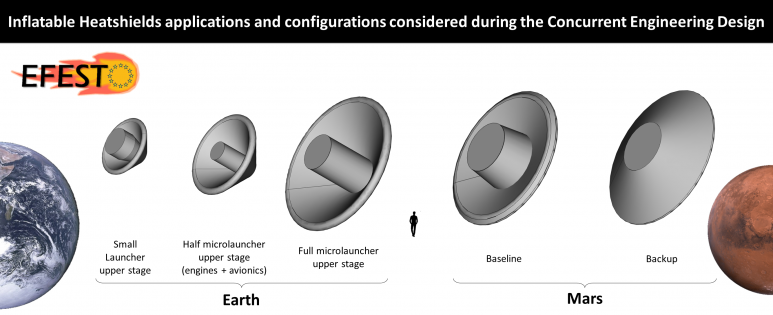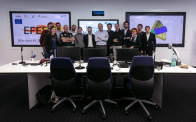Beyond the current space missions limits though the inflatable heat shields
To enable more cost-effective space mission with higher performances, advancement in technologies is needed. Moreover, in the increasing competitiveness of the space sector, European leadership needs to be maintained and enhanced. The current space missions are limited by the launcher fairing size or the rigid heat shields geometrical and structural aspects.
Morphing solutions, such as the inflatable technologies, will allow landing bigger or heavier payload on Mars or will enable the reusability of launchers’ upper stages enhancing European efficiency and cost reductions in the access-to-space industry.
The EFESTO project, coordinated by DEIMOS Space, aims at designing and developing advanced thermal protection systems based on inflatable structures. This technology will open mission scenarios precluded so far by technological limitations. In the space exploration field, the focus is on critical technologies for future larger scale robotic or human Mars exploration, and access to space in which the possibility of recovering and reusing launchers' stages could drastically reduce the costs for access to space.
The team is composed by European experts from DEIMOS Space, DLR, ONERA, CIRA, Aviospace and POLITO and completed a Concurrent Engineering (CE) design session at DLR (German Aerospace Centre) Concurrent Engineering Facility in Bremen, within the goals of the second milestone, including concept definitions of future applications of inflatable heatshields.
Two mission applications have been covered: Mars atmospheric entry with the landing of a large payload at high altitudes (MOLA +2 km, not sustainable by current rigid heatshield technologies) and the re-entry in Earth atmosphere of the upper stage of a currently available expendable launch vehicle.
The EFESTO H2020 project end goal is to improve the TRL (Technology Readiness Level) of inflatable heat shields for re-entry vehicles through tests in laboratory and arcjet facility, with additional advancement for the thermal blanket (multi-layer flexible TPS) and the inflating structure that will be tested at 1:1 scale. Moreover, the project will pave the way toward reaching higher TLR thanks to the design and verification of an IOD mission (TRL 6).

The next steps include the design assessment and the test preparation of disruptive materials and inflatable structures.
This project has received funding from the European Union’s Horizon 2020 research and innovation programme under grant agreement No 821801.


